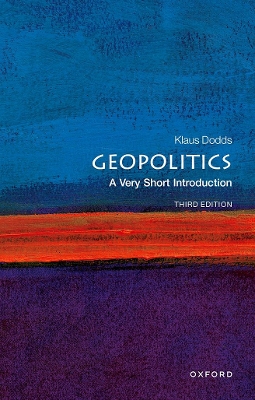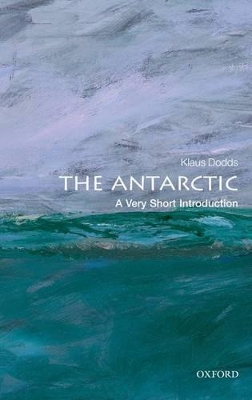Very Short Introductions
3 total works
Geopolitics is a slippery term. From great power politics and speculation about resource scrambles, to everyday encounters and objects such as smart phones, it affects citizens, corporations, international bodies, social movements, and governments. Geopolitics is far more than simply the impact of geographical features such as rivers, mountains, and...Read more
Geopolitics is a slippery term. From great power politics and speculation about resource scrambles, to everyday encounters and objects such as smart phones, it affects citizens, corporations, international bodies, social movements, and governments. Geopolitics is far more than simply the impact of geographical features such as rivers, mountains, and climate on political developments. Geography matters but not necessarily in the way that pundits and presidents assume.
In this Very Short Introduction, Klaus Dodds tours the field of geopolitics, encompassing both its intellectual historical origins and its current concerns. As people struggle to cross borders, moving a few feet either side of a territorial boundary can be a matter of life or death, dramatically highlighting the connections between place and politics. Even far away from the front lines of states, geopolitics remains an important part of everyday life. A country's connectivity,
location, size, and resources all affect how the people that live there understand and interact with the wider world. In this third edition Dodds includes new sections considering the rise of populism and economic nationalism as examples of how states, people, and corporations manage territorial frames for political
projects such as Make America Great Again, One Belt, One Road, and Brexit.
ABOUT THE SERIES: The Very Short Introductions series from Oxford University Press contains hundreds of titles in almost every subject area. These pocket-sized books are the perfect way to get ahead in a new subject quickly. Our expert authors combine facts, analysis, perspective, new ideas, and enthusiasm to make interesting and challenging topics highly readable.
In this Very Short Introduction, Klaus Dodds tours the field of geopolitics, encompassing both its intellectual historical origins and its current concerns. As people struggle to cross borders, moving a few feet either side of a territorial boundary can be a matter of life or death, dramatically highlighting the connections between place and politics. Even far away from the front lines of states, geopolitics remains an important part of everyday life. A country's connectivity,
location, size, and resources all affect how the people that live there understand and interact with the wider world. In this third edition Dodds includes new sections considering the rise of populism and economic nationalism as examples of how states, people, and corporations manage territorial frames for political
projects such as Make America Great Again, One Belt, One Road, and Brexit.
ABOUT THE SERIES: The Very Short Introductions series from Oxford University Press contains hundreds of titles in almost every subject area. These pocket-sized books are the perfect way to get ahead in a new subject quickly. Our expert authors combine facts, analysis, perspective, new ideas, and enthusiasm to make interesting and challenging topics highly readable.
The Antarctic is one the most hostile natural environments in the world. It is an extraordinary physical space, which changes significantly in shape and size with the passing of the seasons. Politically, it is unique as it contains one of the few areas of continental space not claimed by...Read more
The Antarctic is one the most hostile natural environments in the world. It is an extraordinary physical space, which changes significantly in shape and size with the passing of the seasons. Politically, it is unique as it contains one of the few areas of continental space not claimed by any nation-state. Scientifically, the continental ice sheet has provided us with vital evidence about the Earth's past climate.
In this Very Short Introduction, Klaus Dodds provides a modern account of Antarctica, highlighting the main issues facing the continent today. Looking at how the Antarctic has been explored and represented in the last hundred years, Dodds considers the main exploratory and scientific achievements of the region. He explains how processes such as globalization mean that the Antarctic is increasingly involved in a wider circuit of ideas, goods, people, trade, and governance - all of
which have an impact on the future of the region.
ABOUT THE SERIES: The Very Short Introductions series from Oxford University Press contains hundreds of titles in almost every subject area. These pocket-sized books are the perfect way to get ahead in a new subject quickly. Our expert authors combine facts, analysis, perspective, new ideas, and enthusiasm to make interesting and challenging topics highly readable.
In this Very Short Introduction, Klaus Dodds provides a modern account of Antarctica, highlighting the main issues facing the continent today. Looking at how the Antarctic has been explored and represented in the last hundred years, Dodds considers the main exploratory and scientific achievements of the region. He explains how processes such as globalization mean that the Antarctic is increasingly involved in a wider circuit of ideas, goods, people, trade, and governance - all of
which have an impact on the future of the region.
ABOUT THE SERIES: The Very Short Introductions series from Oxford University Press contains hundreds of titles in almost every subject area. These pocket-sized books are the perfect way to get ahead in a new subject quickly. Our expert authors combine facts, analysis, perspective, new ideas, and enthusiasm to make interesting and challenging topics highly readable.



